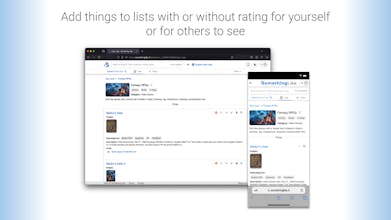
Something Like
System for great recommendations from everyone, for anything
67 followers
System for great recommendations from everyone, for anything
67 followers
Something Like is a community-driven, wiki-style platform for collecting and searching for recommendations on anything. It aims to replace typical "personalized recommendation systems", where driving conversions (i.e., selling stuff) is king.










Something Like
suco
Something Like
suco
Telebugs
Something Like